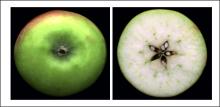The present study investigated how different storage conditions affect antioxidant levels in three scab-resistant and powdery mildew-tolerant apple cultivars. The contents of carotenoids, along with free and glycosylated phenolic acids, were quantified in harvested apples and apples stored in boxes with controlled atmospheric conditions (1.2% O2 and 2.2% CO2) and temperature (1 °C), boxes with regulated temperature (1 °C) and storage rooms with a temperature between 1 and 4 °C. All three cultivars demonstrated a continuous decrease in total carotenoid content (sum of ß-carotene, lutein, neoxanthin, violaxanthin, zeaxanthin and antheraxanthin) during the storage period.
However, apples stored under controlled atmospheric conditions showed significantly higher carotenoid levels than apples stored under other approaches over 3 and 5 months of storage. Although the storage approach clearly affected carotenoid levels across the three tested cultivars, the ratio between the levels of individual carotenoids was neither affected by storage approach nor cultivar. Free phenolic acid contents were found to be cultivar specific; whereas, all three cultivars demonstrated similar glycosylated phenolic acid contents. Chlorogenic acid was the most common free phenolic acid in all three cultivars, while protocatechuic and caffeic acid were the dominant glycosylated phenolic acids identified from the cultivars. Interestingly, stored apples showed higher free phenolic acid levels than harvested apples; while, both harvested and stored apples showed similar concentrations of glycosylated phenolic acids. As such, none of the three tested storage conditions had a pronounced effect on either group of phenolic acids (total content or concentrations of individual compounds).
DOI name
Typ publikace
Periodikum nebo kniha
Datum vydání

